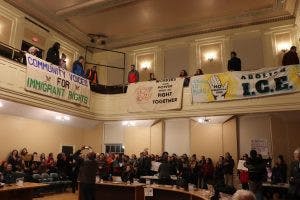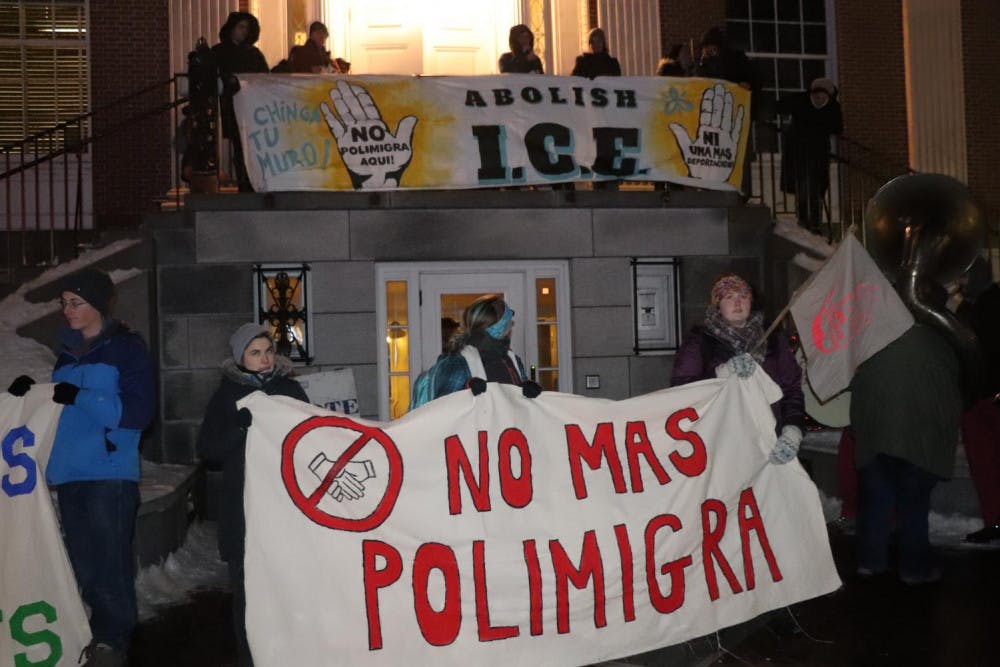BURLINGTON — Over 130 activists, including 20 Middlebury students, rallied in support of a proposed resolution to end collaboration between Immigration and Customs Enforcement (ICE) and the Burlington City Police Department at the Burlington City Council Meeting on Feb. 18.
The resolution aims to close four loopholes within Burlington’s Fair and Impartial Policing policy (FIPP). The current policy allows Burlington police officers to ask about a person’s immigration status if they are suspected to have recently crossed the border, and to report the immigration status of victims and witnesses of crimes to deportation agents. The policy also grants deportation agents access to individuals in police custody, and permits police to share confidential information with immigration agents if they deem it a matter of “public safety.”
“It’s really important that [the resolution] passes because Burlington sets precedent for a lot of other towns that are considering this,” said Leif Taranta ’20.5, a member of Juntos and Sunday Evening Environmental Group, both of which organized student involvement in the protest. “What happens here is going to set the stage for the rest of Vermont.”
So far, Winooski — the town adjacent to Burlington — is the only town in Vermont to have closed the loopholes.
The city council was initially set to vote on the resolution on Jan. 27. After postponing the vote to Feb. 18, they struck it from the agenda shortly before the start of the meeting in favor of what they deemed more time-sensitive matters.
“The City Hall can’t just table important things like this just to suit their own preferences and think that that won’t be met with backlash from the community,” said Lynn Travnikova ’20.5.
No Más Polimigra — whose name combines the Spanish words for police (“policía”) and immigration agents (“migras”) — hosted the rally in collaboration with several other community groups, including Migrant Justice, Community Voices for Immigrant Rights, 350 Vermont and the Vermont ACLU. The rally began outside of City Hall with several activists speaking about the importance of the resolution and expressing their collective rage at its continual deferral.
“This is a fight for our community, this is a fight for dignity, this a fight for the right to live in our community without fear,” said Betsy McGavish, an organizer with No Más Polimigra. “We are here to remind the councilors that they do not have to uphold a white supremicist police immigration state any longer.”

Activists occupied the city hall and chanted slogans for over 30 minutes before the Council Meeting.
Protesters then marched inside, ringing the perimeter of the hall in a dense thicket of bodies, posters, and banners. Several Middlebury students, trained in de-escalation practices by Taranta before the rally, positioned themselves at evenly-spaced intervals along the wall, their bright orange vests highlighting them against the crowd. The room filled with the sound of 130 people chanting “Vermont will fight for immigrant rights”’ for over 30 minutes as the council members filed in, took their seats and faced the protesters.
During the public comment, several migrant dairy workers and undocumented immigrants spoke, recalling their experiences with Burlington police and immigration agents. Hugo Rojas described being detained by ICE after a routine traffic stop, calling the incident “one of the most bitter and difficult experiences of [his] life.”
According to No Más Polimigra, the FIPP loopholes violate immigrants’ rights to fair and equal treatment under the law, undermine public safety by scaring immigrant communities away from reporting crimes or working with the police, and divert resources away from community policing towards immigration enforcement.
“In these times of increased disparity of justice and wealth there is oppression coming down from the federal level, and we need to stand up on the state and local level and set an example for the rest of the country,” said Vermont State Representative Brian Cina.
“I call on the city of Burlington to take this action with the community here watching because we will be watching. We’ll be coming out of the shadows to raise our voices and make ourselves heard,” said Enrique Balcazar, a Migrant Justice leader and migrant dairy farm worker.
Throughout the course of public comment, tensions escalated between protesters and City Council President Kurt Wright. Wright repeatedly ordered the crowd to “be respectful” and not cheer for those speaking. Though the council limited public comment to one hour, several activists continued speaking even after the time had elapsed. One woman accused the council of upholding white supremacy through Wright’s conduct.
The City Council is set to vote on the proposed resolution on March 9. No Más Polimigra plans to hold another rally at that meeting. The protesters signaled their intent as they filed out of City Hall chanting, “We’ll be back on March 9th.”
“We are going to make our voices heard,” said Travnikova, “and we are going to keep coming.”

Sophia McDermott-Hughes ’23.5 (they/them) is an editor at large.
They previously served as a news editor and senior news writer.
McDermott-Hughes is a joint Arabic and anthropology and Arabic major.
Over the summer, they worked as a general assignment reporter at Morocco World News, the main English-language paper in Morocco.
In the summer of 2021 they reported for statewide digital newspaper VTDigger, focusing on issues relating to migrant workers and immigration.
In 2018 and 2019, McDermott-Hughes worked as a reporter on the Since Parkland Project, a partnership with the Trace and the Miami Herald, which chronicled the lives of the more than 1,200 children killed by gun violence in the United States in the year since the Marjory Stoneman Douglas High School shooting in Florida.




